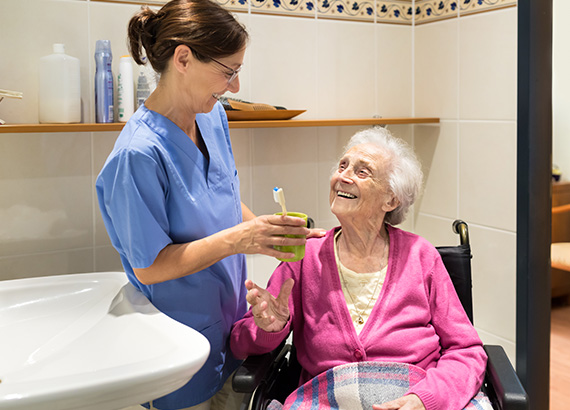Elderly Oral Health and Hygiene: Part Two

In Part Two of our series on elderly oral health and hygiene, we focus on its connection to nutrition. If you’re caring for an elderly loved one, their oral health directly impacts their ability to eat comfortably and maintain overall health. Poor oral hygiene can lead to malnutrition, affecting their energy, strength, and quality of life, while also increasing the risk of certain diseases.
At Vermont Aged Care, we understand the critical link between oral health and nutrition. Oral pain and difficulty eating can negatively impact nutritional intake, body weight, and, ultimately, overall well-being.
Oral Health and Nutrition
Experts agree that oral discomfort can lead to issues with eating. If eating is painful, elderly individuals may start avoiding food, especially harder-to-chew items, which can quickly lead to malnutrition. Social isolation during meals may also discourage eating, and poor nutrition is often associated with conditions like arthritis, osteoporosis, and depression.
Key Signs to Watch For
-
Pain When Eating
Watch for signs of discomfort, such as avoiding certain foods or chewing unusually. -
Loss of Body Weight
Sudden or unexplained weight loss is a serious sign and should be investigated. -
Changes in Skin Appearance
Look for dry, itchy, or sallow skin, which may indicate nutritional deficiencies. -
Reduced Strength and Stamina
If your loved one seems fatigued or less mobile, poor nutrition could be a factor. Incontinence can also be linked to nutritional deficiencies.
Practical Solutions
-
Create an Enjoyable Mealtime Atmosphere:
Socialising over meals or playing background music can encourage eating. If permitted, a small glass of a favorite beverage may help boost appetite. -
Serve Softer Foods:
Soft, easy-to-chew foods can reduce discomfort and risk of choking. Incorporate favorite foods and balanced nutrition to make meals enjoyable. -
Ensure Hydration:
Along with tea or coffee, make sure they are drinking enough water, as sugary drinks don’t replace the need for hydration.
In Conclusion
Maintaining healthy nutrition for the elderly can often be integrated into regular family meals with small adjustments, such as softer food textures and timely meal schedules. Regular mealtimes also support better sleep and overall happiness.
Look out for the final part of this series, where we’ll discuss helpful services like Meals on Wheels. Until then, we wish you and your elderly loved ones continued good health from our Vermont Aged Care family.
Recommended Reading:
- Care of Older People Toolkit – Oral Health
- Nutrition and Caring for Elderly Parents
- Nutrition and the Elderly – NCBI
This blog provides general advice. Please consult your GP for personalised information, or contact Vermont Aged Care for professional support regarding residential aged care.

